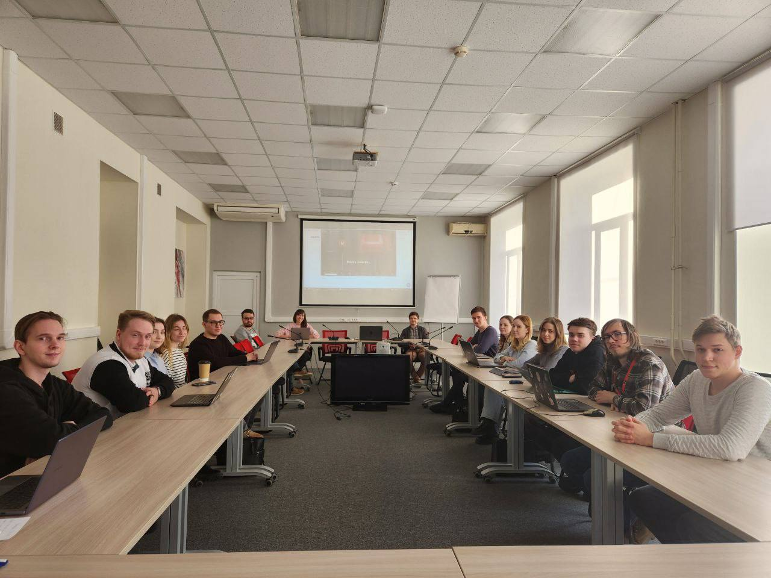.jpg)
Intellectual Capital in the Face of Shocks: Russia and Iran Explore Internationalisation
In today's issue of Schola, Mariya Molodchik, Senior Research Fellow at the International Laboratory of Intangible-Driven Economy and Professor at the School of Economics and Finance at HSE University’s Campus in Perm, discusses a joint project with Iran University of Science and Technology, titled 'Internationalization of Companies from Developing Countries: The Role of Intellectual Resources in Response to Exogenous Shocks.'

‘A Space Where You Can Ask Questions and Make Mistakes’
Regular, long-term seminars are an important part of the work of HSE research teams. Petr Parshakov, Professor at the School of Economics and Finance of the Faculty of Computer Science, Economics, and Social Sciences at HSE University–Perm and Head of the International Laboratory of Intangible-Driven Economy, talks about the laboratory’s regular seminars: why such meetings are needed, how they are organised, the secret of successful seminars, and the place seminars hold today in academic life.

Civic Identity Helps Russians Maintain Mental Health During Sanctions
Researchers at HSE University have found that identifying with one’s country can support psychological coping during difficult times, particularly when individuals reframe the situation or draw on spiritual and cultural values. Reframing in particular can help alleviate symptoms of depression. The study has been published in Journal of Community Psychology.

‘You Are Our Future’: HSE Rector Visits Perm Campus on Knowledge Day
On September 1, 2025, Rector Nikita Anisimov visited the HSE Campus in Perm. During his trip, he took part in the opening ceremony of the new academic year and attended the traditional assembly of the HSE Lyceum in Perm.

Scientists Clarify How the Brain Memorises and Recalls Information
An international team, including scientists from HSE University, has demonstrated for the first time that the anterior and posterior portions of the human hippocampus have distinct roles in associative memory. Using stereo-EEG recordings, the researchers found that the rostral (anterior) portion of the human hippocampus is activated during encoding and object recognition, while the caudal (posterior) portion is involved in associative recall, restoring connections between the object and its context. These findings contribute to our understanding of the structure of human memory and may inform clinical practice. A paper with the study findings has been published in Frontiers in Human Neuroscience.

Researchers Examine Student Care Culture in Small Russian Universities
Researchers from the HSE Institute of Education conducted a sociological study at four small, non-selective universities and revealed, based on 135 interviews, the dual nature of student care at such institutions: a combination of genuine support with continuous supervision, reminiscent of parental care. This study offers the first in-depth look at how formal and informal student care practices are intertwined in the post-Soviet educational context. The study has been published in the British Journal of Sociology of Education.

Course Selection for First Half of 2025/26 Academic Year Begins on September 5
Задача всех студентов — выбрать дисциплины и расписание учебных групп к ним

Applications Open for Student Research Paper Competition 2025
The annual Student Research Paper Competition (SRPC) offers students the chance to showcase their work, such as term papers or theses. It is a valuable opportunity to receive expert feedback and recommendations aimed at improving research, as well as to take the first steps in an academic career. Below we outline the key features and deadlines for submitting entries.

Immune System Error: How Antibodies in Multiple Sclerosis Mistake Their Targets
Researchers at HSE University and the Institute of Bioorganic Chemistry of the Russian Academy of Sciences (IBCh RAS) have studied how the immune system functions in multiple sclerosis (MS), a disease in which the body's own antibodies attack its nerve fibres. By comparing blood samples from MS patients and healthy individuals, scientists have discovered that the immune system in MS patients can mistake viral proteins for those of nerve cells. Several key proteins have also been identified that could serve as new biomarkers for the disease and aid in its diagnosis. The study has been published in Frontiers in Immunology. The research was conducted with support from the Russian Science Foundation.

HSE Scientists Test New Method to Investigate Mechanisms of New Word Acquisition
Researchers at the HSE Centre for Language and Brain were among the first to use transcranial alternating current stimulation to investigate whether it can influence the acquisition of new words. Although the authors of the experiment have not yet found a link between brain stimulation and word acquisition, they believe that adjusting the stimulation parameters may yield different results in the future. The study has been published in Language, Cognition and Neuroscience.

